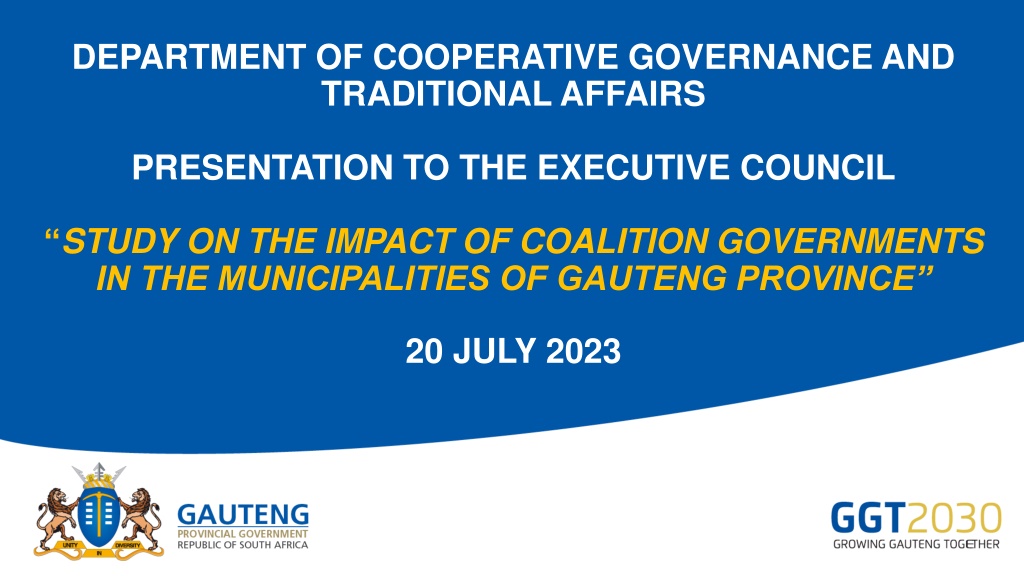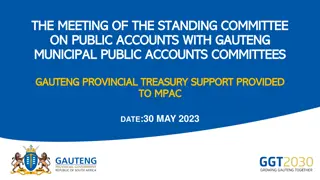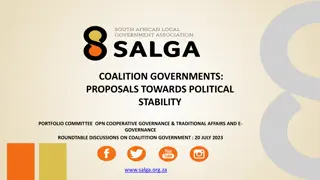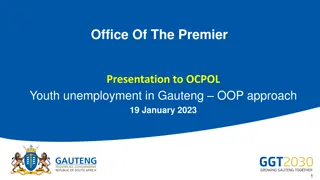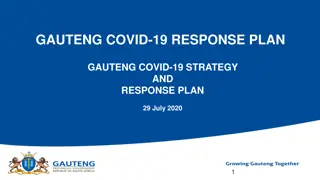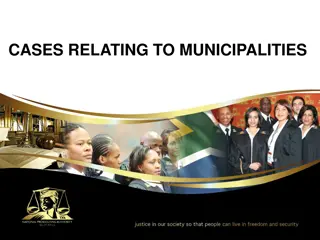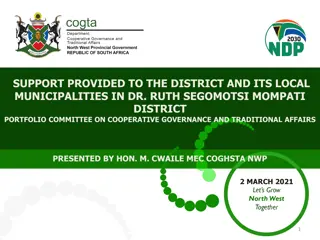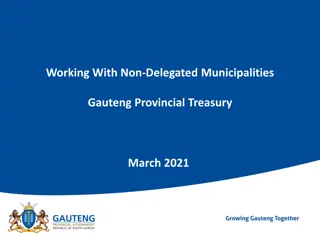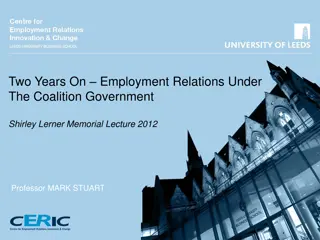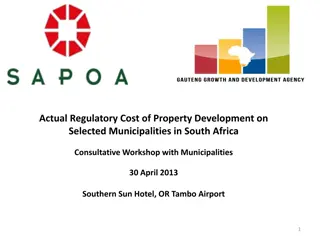Study on the Impact of Coalition Governments in Gauteng Municipalities
The Department of Cooperative Governance and Traditional Affairs conducted a study on the impact of coalition governments in Gauteng municipalities. The study aims to understand the dynamics, challenges, and effects of coalition governments on governance, service delivery, and administration. With the rise of coalitions in the province, the study seeks to provide insights, options, and recommendations for better policy frameworks and stability in municipalities facing coalition governance.
Download Presentation

Please find below an Image/Link to download the presentation.
The content on the website is provided AS IS for your information and personal use only. It may not be sold, licensed, or shared on other websites without obtaining consent from the author. Download presentation by click this link. If you encounter any issues during the download, it is possible that the publisher has removed the file from their server.
E N D
Presentation Transcript
DEPARTMENT OF COOPERATIVE GOVERNANCE AND TRADITIONAL AFFAIRS PRESENTATION TO THE EXECUTIVE COUNCIL STUDY ON THE IMPACT OF COALITION GOVERNMENTS IN THE MUNICIPALITIES OF GAUTENG PROVINCE 20 JULY 2023
Table of Contents 1. Purpose 2. Background and Rationale 3. Approach and Methodology 4. Current SA Constitutional and Legislative Frameworks 5. Theoretical Frameworks 6. Literature Review: Global and Local Assessment 7. Key Findings 8. Options going forward 9. Recommendations 2
Purpose The purpose of the presentation is to share with the Portfolio Committee the: Findings, observations and options going forward articulated in the study on the impact of coalition governments in municipalities in Gauteng 3
Background and Rationale Emergence of coalitions in GP, where 10 out of 11 municipalities are hung Need to understand the phenomenon, dynamics and challenges of coalitions The landscape is changing, and coalitions are on the rise. To assist the department to better understand the phenomenon of coalitions at local level especially how they are formed, the political dynamics and challenges they pose; To assess the impact of the coalition governments on governance, service delivery and administration in Gauteng especially in the metros; To assist the department to develop clear policy frameworks or position on coalition governments; To assist the department to develop appropriate instruments including legislative and regulatory frameworks to ensure stability of coalition governments; To enable the department to develop framework for monitoring, supporting and intervening in municipalities with coalition governments. 4
Rise of Coalitions (Cont..) Election Year Number of Hung Municipalities 2000 29 2006 31 2011 37 2016 27 2021 71 7
Coalitions in GP Municipalities Municipalities City of Ekurhuleni City of Johannesburg City of Tshwane Emfuleni Lesedi Merafong LM Mogale City Rand West LM Sedibeng DM WRDM Coalitions (Fluid) ANC, EFF, AIC, IRPA and PA (Voting) ANC,PA, Al Jamah, COPE, EFF (voting) DA, FF, ActionSA, COPE,ACDP and IFP ANC and New Horizon Movement ANC and Socialist Economic Freedom Movement ANC and MAOC ANC, EFF and ATM (Voting) ANC, PA, AIC and RPP ANC, PAC and Solidarity ANC, EFF and AIC (voting) 8
Aims and objectives The main aim of study was to: Review current challenges of coalitions and propose interventions and instruments to manage them better focusing on various aspects including how coalitions should be formed, determination of who should lead or form coalitions, how coalition agreements should be developed, principles underpinning those agreements, duration of those agreements, how agreements should be registered and terminated, dispute resolution etc.; and Enquire into the phenomenon of coalitions locally and globally with a view to understand coalition dynamics, challenges they pose on governance, service delivery, administration, and experiences with managing them; Review constitutional and legislative frameworks with a view to understand their application, the gaps and what needs to be put in place to strengthen them; Review current policy frameworks applicable to coalitions with a view to understand gaps and propose policy options and positions moving forward including the issue of whether coalitions are consistent with the democratic principles and values in the constitution; Review current monitoring, support and intervention frameworks and instruments at provincial level, assess gaps in relation to coalition governments, and propose what needs to be done to assist the province support coalitions government better. 9
Approach and Methodology 04 Project Closure 03 Project Delivery 02 Submission of final report and closing report.. As Is Assessment 01 Implementation of various phases of the project. Project Inception Review of background material and project scoping Project Inception meeting, detailed planning and contracting. 10
Approach and Methodology (Cont..) Used a combination of literature review, interviews and group interviews/discussions; Literature Review: Extensive review of local and global literature on various aspects of coalitions; Interviews: Interviewed a Mayor, Whip, Councillors, political parties, current and former City Managers. CoGTA National and experts; Group interviews/discussions with CoGTA GP senior officials and Councillors in one municipality; and Validation Session with senior practitioners and experts on governance and coalitions 11
Current SA Constitutional and Legislative Frameworks
Current SA Constitutional and Legislative Frameworks Constitutional democracy is where all spheres, legislatures and executives exercise power subject to the constitution; Provincial governments have constitutional and legislative authority to determine types of municipalities, monitor and support them while municipalities have autonomy and rights to govern on own affairs; Unitary state where provincial and local government while have own powers they exercise those subject to the Constitution and national policy and legislation; Multiparty democracy and proportional representation are the cornerstone of our constitutional democracy and electoral system; While there are no explicit legislative provisions on coalitions the constitution and LG legislation set out basic frameworks that enable coalitions. 13
Constitutional and Legislative Frameworks (Cont..) Like South Africa, most if not all countries reviewed provide for a multi- party system at national, regional and local level in their constitutional frameworks. They also provide for proportional representative system in the election and composition of national parliaments, federal or regional parliaments and local councils. They also have national legislation that provides for systems of local government in terms of how municipalities must be demarcated, established, how Councils should be formed, how mayors should be appointed or elected, and how committees of Councils should be constituted etc. 14
Constitutional and Legislative Frameworks (Cont..) Some of the countries like Germany and Belgium are federal in character and therefore the overall power arrangements between central, regional local would differ from South Africa. One of the distinguishing features between South Africa and some of the European countries reviewed is the fact South Africa has entrenched local government as an independent sphere of government with original powers contained in the constitution. In most of the countries reviewed, local government is still treated as a lower tier of government and a creature of statutes. For example, in Netherlands and Belgium, their Mayors are senior civil servants appointed to lead Council for a period of six (6) years and cannot be removed by Council during a term of office. This factor is key to determining coalition formation and stability in these countries. So, while there are similarities in constitutional and legislative frameworks between South Africa and some of the European countries, there are differences in certain important respects. 15
Theoretical Frameworks Factors that affect success and failure of coalitions Critical review of coalition theories Types coalition parties Definitions of coalitions Types of coalitions 16
Types of Coalitions Types Definitions Tendencies Grand Coalitions Big coalitions with big numbers that far exceed the required 50+1.Sometimes called Surplus Coalitions. Very rare and few but where they happen are fairly successful. Minimum Coalitions Small coalitions with numbers just enough to win 50+1. Often is one big party with few small parties. Very common and if well managed can be successful. Minority Coalitions Coalitions that do not reach 50+1 but depend on support from other parties on an issue-by-issue basis. Rare and where they happen, do not last. 17
Types of Coalition Parties COALITION THEORIES DESCRIPTIONS EXAMPLES Office Seeking Theory Coalitions partners who simply seek to be in power and occupy positions of influence King makers Policy Seeking Theory Coalition partners that enter into partnerships on the basis of common policy or seek to change policy direction Big parties Vote Seeking Theory Coalition partners that seek to be in office in order to position themselves for the next elections New parties/kingmakers Median legislator Theory Coalition partners that seek to take neutral stance to be relevant to all interests Old settled parties just happy to be there Non unitary party Theory Coalition partners that cause internal imbalance impact on coalitions Often big dominant parties 18
LITERATURE REVIEW: GLOBAL AND LOCAL ASSESSMENT
Overview Coalition governments are a phenomenon common to all the central and eastern European countries. The study reviewed experiences of various countries in the continent and Europe with a view to discern good practice that could be applicable and offer solutions to South Africa in all its context and uniqueness. Various countries including Kenya, Sweden, Belgium, Denmark, Germany, Israel, England and the Netherlands were reviewed. 20
Local Government Systems All the countries reviewed have defined their local government systems in their national legislation in one form or the other. In all the countries reviewed, a system of multi-party democracy exists. Councils are elected directly by communities and Councils are established for a term of 4 to 5 years for each election cycle. Seats in Council are allocated on a proportional representation basis. In Denmark, Sweden and Norway, Councils elect Mayors like in South Africa but in other countries like Netherlands and Belgium the Mayors are appointed by federal or regional (provincial equivalent) for a defined period of six (6) years. 22
Constitutional and Legislative Frameworks In other countries like Germany, the Mayor is directly elected in a system akin to the presidential election system. In many, if not all the countries reviewed, security of tenure for the Mayor is assured or guaranteed. In the system where the Mayor is appointed by government, he/she cannot be removed by Council. In instances where the Mayor is elected by Council like in Sweden, Denmark and Norway, he/she cannot be removed either by Council as their term is fixed in law. Where the Mayor is directly elected, he/she can only be removed by community vote like it recently happened in Frankfurt where 95% of voters voted for the Mayor s recall. 23
Constitutional and Legislative Frameworks There are number of lessons to be learned from these countries on coalition management. Many of the European municipalities are hung and therefore under coalition governments. This is so because most of these countries operate on multi-party democratic system, use proportional representative system and generally do not have a single party dominance at local level. While there are ructions from time to time within coalitions, the Europeans have long histories of democracy, institutionalized coalitions and matured their systems over a long period of time. They have also cultivated and embedded a culture of coalitions to the extent that the general orientation is that coalitions are a norm, and every party must do everything to build consensus. The system of providing security of tenure for Mayors, takes away the heat and separation of powers between the executive and legislature are contributing to the creation of stability in coalition governments of many municipalities in these countries. 24
Coalition Formations Without exception, these countries have also designed their systems in a manner that formation of coalitions is tightly managed/regulated to avoid unnecessary complications and fights. Their laws allow enough time for parties to negotiate. Unlike in South Africa, where Councils must be established within 14 days following an election, in some of these countries, parties are allowed close to 2/3 months to set up Councils. This gives them enough time to negotiate good deals instead of hurried deals just to get coalition in place. These types of negotiations result in what is called 'transactional' approach to power-sharing and coalition arrangements . 25
Coalition Formations (Cont..) The second aspect of coalition formation relates to who forms or leads in coalition formation. Many of the countries reviewed do not necessarily regulate this area except for the widely known practice in Israel of allowing big parties to have the first opportunity to form coalitions seems to be preferred. This approach allows for big parties to lead the way hoping that grand or winning majority coalitions can emerge instead of minority coalitions which are known to be fragile the world-over. The big party approach has been criticized for tilting the balance in favour of dominant parties at the expense of small ones, but it is a critical mechanism that brings in some balance and stability in the system. 26
Types of Coalitions The local government system in many of the countries reviewed are also designed to produce grand or winning majority coalition governments. Based on experience of many years, they realised that even though parties have a choice of who they want to form a coalition with, minority coalitions are fragile and risky as they tend to crumble even when only one party withdraws. So, they prefer grand or winning majority coalitions, and to enable that, apart from giving big parties first right to form coalitions, they have also introduced thresholds for parties to gain a seat in Council. 27
Thresholds In South Africa, except for the national assembly which has set 0,25% threshold, there is practically no threshold in local government. The electoral system uses natural or some fractional calculus to eliminate parties from seat allocations. In Denmark they set a threshold at 2% and Germany at just under 5%. In other systems, they set the limit at 4 seats, so in other words, if you cannot obtain 4 seats in Council you don t qualify. The system is meant to make sure that only parties with higher numbers are in Council and thereby create chances for grand or winning majority coalitions. 28
Coalition Agreements Many of the countries reviewed do not necessarily legislate for coalition agreements in the sense of prescribing form, content and nature of the agreements but they at least encourage parties to develop such agreements and legally require political parties to publish them so that the public knows what is in those agreements. In all of the countries reviewed, it has been acknowledged that coalition agreements are difficult to regulate let alone to enforce as they are political rather than legal contracts. As the Report from the Danish Study notes: While not legally binding, these agreements are considered morally binding and a failure to adhere to them, will be viewed negatively by the electorate and parties that breach the contract are punished at the polls . 29
Coalition Management Many of the studied countries encourage municipalities to set up political management structures at local level to manage coalitions. They insist on those structures being local and minimise involvement or interference by regional or national leaders as that can be intrusive and disruptive. In Denmark, the local leaders of political parties have more power in decision- making and the management of coalition affairs. The governments in these countries also encourage coalition partners to set dispute resolution mechanisms with clear warning signals and processes of timely intervention to anticipate and arrest crises before they happen. These mechanisms are key to assure stability of governance at local government level. 30
Coalition Management (Cont..) For example, in Denmark, voters expect parties to behave in a certain way and deliver a coalition government that is cohesive and stable. Parties that compromise the stability of coalitions or are 'politically anti- social' are punished by the electorate . In Denmark, Mayors can t be removed through spurious motions of no confidence, bringing stability to local councils. They may only be removed in limited circumstances, akin to an impeachment procedure, where the mayor has committed an offence or material constitutional breach . 31
Coalition Challenges Coalitions are difficult to establish because small parties hop-around for deals, cannot be trusted and they act as kingmakers with self-interests. Small parties come into coalitions with short term, narrow and parochial agendas for themselves and their constituencies disregarding the bigger picture (service delivery). Small parties come in and immediately want their manifestos to be provided for or insist on change of municipal plans, programmes and budgets despite the fact all those are regulated by the law. Leaders of small parties are often inexperienced in local government and make demands that are not legally compliant. We have been a one-party dominant state for too long and we are not yet ready for coalitions as a country. 33
Coalition Challenges There is too much involvement of national and provincial or regional leaders in local coalition government s affairs. Political temperatures between parties nationally tend to impact on the stability of coalitions locally. Absence of legislation regulating coalitions has added to the problems of coalitions. Coalition agreements are generally kept a top secret ,don t focus on policy and are often unenforceable. Small parties are kingmakers, are self-centered, chase after every office opportunity they see, blackmail big parties and sometimes extort them and the big parties feel vulnerable. 34
Coalition Management Coalition Challenges The Mayoral Executive was designed with single party majority in mind. The coalitions have disrupted the system as the Executive Mayor no longer has unfettered power promised in legislation to set up MAYCO and appoint MMCs, it is now parties in coalitions that determine who becomes an MMC. Emerging Types and Patterns of Coalition Many of the coalitions emerging in RSA are minimal majority coalitions especially those involving the ANC and the DA. However, the DA has had some minority coalitions. There s an emergence of minority Mayors and this undermines the democratic principle of majority rules, this has happened in Tshwane, Johannesburg, Ekurhuleni and Mogale City. 35
Impact on Governance Impact of Coalitions on governance, administration and Service Delivery: There is no stability in governance due to continuous motions of no confidence and frequent removals of governments. The challenge has been how to manage transition from new government with new players with multiple policies in terms of programming and budgeting. Coalitions affect planning, impact decision making. Political leaders especially those who are new, interfere with administration. Coalitions cause a lot of uncertainty in the administration especially with never ending changes in government. 36
Impact on Governance (Cont..) Lack of certainty around tenure of senior managers especially MMs. High rates of turnover of senior and skilled staff. MMs placed in invidious position of having to manage coalition governments with agreements that are not disclosed and that may border on illegality. MMs placed in precarious position of chairing meetings for unseating of coalition governments. Need to separate party and state as a starting point in managing coalitions. 37
Impact on Governance (Cont..) The coalitions have introduced multiple structures and multiple layers of consultations and decision making is slowed down incredibly and this goes against the original designs of the Mayoral Executive Type system National and provincial politics interfere with governance at local level. High levels of politicization of administration at management level. Lack of trust between incoming coalition partners and senior management especially MMs. Interference of new coalition partners in the appointment of staff and Rush to change things including Boards of entities etc. 38
Impact of Coalitions Governance Frequent change of functionaries, decision making, reporting and accountability Administration Uncertainty of management positions, interference in admin, appointment of staff and SCM Service Delivery Adoption of budgets, change of priorities, decision making that impact implementation of projects 40
Stability: Historical/Political Factors Long history of national, racial or ethnic conflict. Racial, class and ethnic divisions in society. Long history of experience and practice with coalitions. Long history of single party dominance. Political and ideological factors. 41
Stability: Constitutional /Legislative Factors When the constitutional and legislative frameworks provide for Proportional Representation, coalitions are most likely to be on the rise; Although the constitution and Municipal Structures Act do not per se speak of coalitions, its frameworks enable them; While other countries do not regulate many aspects of coalitions, for a younger democracy it may be necessary; While legislation may be required to regulate coalitions, it is important to be careful about what and how you regulate. 42
Stability: Institutional / Mayoral Executive Type The type was designed for quick decision making and agility in execution at EXCO level. The type however does not lend itself well to coalitions as the type was designed for single party majority governments where the Executive Mayor would have free hand to choose MMCs but now MMCs are chosen by other parties. With MMCs now having to account to political parties, accountability issues arise. With the advent of coalitions there is multiple centers of decision making . With the advent of coalitions, the system is susceptible to disruption by the so- called kingmaker parties. The design was also anchored around the person of the Mayor such that if he/she is removed, the whole MAYCO is dissolved thus causing lot of instability. 43
Stability: Institutional / Mayoral Executive Type (Cont..) The system makes the EM the main and constant target as his/her departure also creates opportunity for jostling and rearrangement of power, hence endless motions of confidence. Because of lack of regulation and application of proportionality in constituting MAYCO, the small parties become king-makers and end up wielding huge amount of power, and sometimes becoming Mayors by default. Because of this gap, small parties get into Exco positions and possible access and control of resources, the stakes for them get raised to the extent party barons pull strings from outside. Also, the system in the context of coalition fails to recognize the significance of numbers gained by parties during elections. With MMCs coming from other political parties, the Mayor losses control as these MMCs see themselves as accounting only to their party bosses. 44
Stability: Institutional / Collective Executive Type This type allows for Council to constitute EXCO with the Mayor as the head. With the proportional allocation of seats into EXCO, it eliminates small parties from being kingmakers , and ending up being Mayors. It would allow recognition of numbers polled by big parties and afford them place in the EXCO. It would reduce constant targeting of the Mayor as his/her position would just be ceremonial. It would prevent a situation where each time the Mayor vacates the position, the EXCO collapses, as members are not his/her appointees. It would create stability, certainty and predictability in the system. 45
Stability: Institutional / Collective Executive Type It forces dominant and competing parties to work together, and there are no guarantees. The dominant parties could be uncomfortable serving in the same Committee, and this may be an unrealistic option. The normal tensions between dominant parties may lead to constant fights and thus delays in decision making and constant deadlocks. The tensions between dominant parties could easily degenerate EXCO to fights that have characterized normal coalitions. This type is not totally insulated from problems of coalition, e.g. eThekwini. The type may not be introduced mid-term without legal challenges, (the Nelson Mandela Bay Metro case). 46
Stability: Institutional / Observations The Mayoral Executive Type is vulnerable and unraveling under coalitions The Collective Executive Type resolves stability but may present challenges of around speed of decision making etc. May be necessary to amend Municipal Structures Act to allow more time to negotiate coalitions. May need to examine the utility value and constitutionality of allowing big parties to negotiate first. May need examine the utility value and constitutionality of regulating coalition agreements save for requirement for publication. 47
Stability: Coalition and Party Types Grand coalitions are generally unlikely at local level as big parties are competitors; Minority coalitions are generally fragile and unstable; Minimal majority coalitions tend to work better; Party leaders, mainly from small parties are inexperienced, parochial in their approach and can cause instability; and Party leaders, mainly from small parties tend to be office and seeking and opportunistic and pose challenges to stability of coalitions. 48
Summary of Findings Coalition governments in Gauteng have struggled to hold and tended to collapse; The causes for collapse are wide and varied but include historical factors, political factors, institutional factors, legislative factors and coalition types factors. At the Centre of instability of coalitions is the vulnerability of the Mayoral Executive system due to its attributes, significance attached to the Mayor and power change associated with his/her removal. The situation is made worse by absence of regulatory frameworks especially in managing motions of confidence. 49
Summary of Findings (Cont..) The situation has also been complicated by types of coalitions where it is clear that coalitions that have bigger number of parties have not succeeded. The situation has also been compounded by increasing number of small political parties in Council and their tendency to be opportunistic and acting as kingmakers. Lack of maturity and experience of some of the leaders of these small parties has also not assisted. Coalition governments and their frequent collapse have tended to impact governance, administration and service delivery. 50
